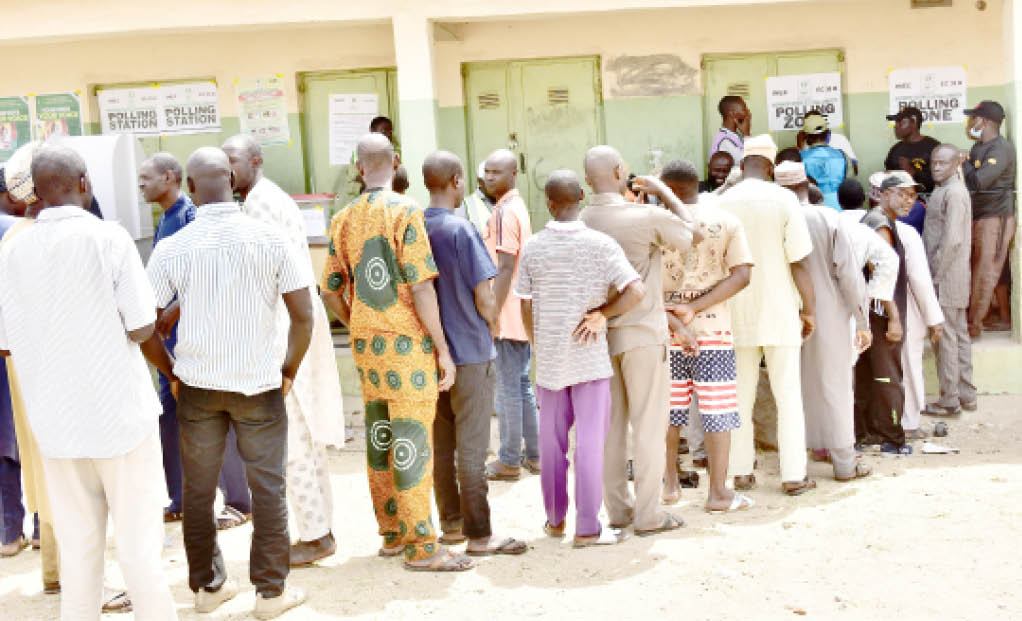Twenty-seven days to the commencement of the implementation of the Central Bank of Nigeria (CBN) policy on cash withdrawal, top politicians and candidates vying for elective positions are strategising on how to bypass the policy in funding their campaign activities.
The country’s apex bank had on December 6, under the new withdrawal policy, restricted the maximum cash withdrawal over the counter (OTC) by individuals and corporate organisations per week to N100, 000 and N500, 000 respectively. It also limits individual Point of Service (POS) to N20, 000 per day.
Daily Trust reports that the policy, titled Naira Redesign Policy – Revised Cash Withdrawal, bank said the policy will take effect on January 9, 2023, 47 days before the February 25, presidential and National Assembly election.
Mixed reactions have been trailing the policy since the bank made the announcement.
- Senate moves to stop appointment of EFCC chair from outside
- Tinubu in Kaduna, vows to eliminate kidnappers, bandits
Both the Senate and the House of Representatives had last week faulted the policy, saying the country was not ripe for a cashless policy and that it would pauperise Nigerians. Candidates and party chieftains interviewed said the commencement of the implementation of the policy at the peak of the campaign, would affect the disbursement of what they tagged ‘logistics’ during the election.
However, chieftains of the Peoples Redemption Party (PRP) and the New Nigerian Peoples Party (NNPP) said the policy would not affect their campaigns.
Daily Trust reports that during elections, parties and candidates vying for elective positions through their agents disburse funds in cash to woo voters ahead of the election. There have been several calls on the government and the electoral body to halt the inducement of voters to strengthen the country’s electoral process. The introduction of the policy, analysts said, would go a long way in addressing vote buying.
Presidential candidates to spend N1.8bn on agents
Daily Trust reports that there was no provision in the new CBN policy on how presidential candidates and political parties would pay agents on Election Day.
According to regulations and guidelines for the conduct of elections, political parties sponsoring candidates are to appoint one person for each of the polling units for monitoring the elections.
There are 176,974 polling units across the country. Each of the presidential candidates requires 176,974 agents to man the polling units. A chieftain of the APC said for the agents alone, N2bn was required to pay their allowances on Election Day.
“The least you can give to each of the agents is N10,000 on election day and it has to be in cash because it is for logistics. They are paid through coordinators. If you calculate it, you will have about N1.8bn.
“In addition to the polling units, you would mobilise top shots of your party, including commissioners, ministers, senators, members of the House of Representatives, state assembly members and appointees to deliver their areas,” he said.
Parties, candidates strategise
To bypass the policy, our correspondents report that top politicians are making contingency plans on how to paddle through the intriguing policy.
Chieftains in Nasarawa State are reported to be compiling the account details of would-be agents for the 2023 elections.
In Keffi Local Government Area of the state, local politicians who served as agents for the APC in two elections said they have submitted their account details.
“I am a loyal APC member and I have been serving as an agent for APC in the past two elections. Our party chieftains in the local government have taken our names and account details for the 2023 election agent mobilisation.
“This is not illegal. Agents get lunch and logistics money from the party during elections, and this is not only restricted to APC, all parties do this. Yes, this is the first time that they are requesting our account details. As I said, I don’t see anything wrong with it,” he said.
In Kano, while the PDP believes the policy will affect its campaign, the NNPP and PRP said the policy will not affect their campaign in any negative form.
In a chat with our correspondent, Aminu Baba, the Director General of the PDP gubernatorial campaign council, said even aside from politics, the policy was not a good one and it will affect the campaign trail as much as it affects ordinary Nigerians.
“We are flagging off our campaign this weekend and we plan to mobilise at least 100 vehicles, now imagine if this is happening with the withdrawal limit. Even by the time the policy kicks off, we will be mobilising a minimum of 20 vehicles for every campaign stop and we need to fuel these vehicles at fuel stations, many of which do not have POS or receive a transfer, how do we take care of this?” he asked, adding that while those in urban areas may face a little challenge with the cashless policy, good thoughts should have been given to rural areas.
He advocated that the apex bank should consider increasing the daily limits to reflect realities.
However, the DG of the NNPP Campaign Management Directorate in Kano State, Ali Makoda, said the party is happy with the policy, adding that those that are familiar with the Kwankwasiyya Movement know that “We don’t give (money) and we don’t spend (money) on mobilisation for our events.”
He said for the party, all that was needed was for the people to be informed of the itinerary of the party and they will show up without waiting for anyone to mobilise them. “Let me tell you the truth, we are even happy with the policy,” he added.
Similarly, the Kano State governorship candidate of the PRP, Salihu Tanko Yakasai said in as much as the policy is a good one that will not affect his campaign in any way, the apex bank still needs to do more with sensitisation, especially in the northern rural areas.
He said aside from the issue of sensitisation; poor implementation strategy may be the albatross of the policy.
We’re yet to take a position – APC
Contacted, the ruling All Progressives Congress (APC) said it is yet to take a position on the issue. The Director of Public Affairs and Chief Spokesperson of the Tinubu/Shettima Presidential Campaign Council and Minister of State for Labour and Employment, Festus Keyamo (SAN) told Daily Trust in a chat yesterday that the issue was yet to be deliberated upon.
“As a Council, we are yet to deliberate and take a position on this issue,” he said.
It will affect our campaigns – LP
But the Labour Party (LP) has said the policy would affect its campaigns negatively.
In a telephone chat with Daily Trust yesterday, the Chief Spokesperson of the Obi/Datti Presidential Campaign Council and former Chairman of the Inter-Party Advisory Council (IPAC), Dr Yunusa Tanko, called on the CBN to revisit the policy.
“It will affect our physical exchange of cash. We don’t even have the fund, but it will affect us. But those who have stashed this country’s money into their private wallet are the ones who will feel the pain the more.
“On our own, we can manage, but it will affect us. We wish it should be done in such a way that it will have a human face because we are going to use physical cash.
“We are thinking that it will be good that the CBN takes a deeper look into the policy and makes a decision that will at least, be manageable for everybody for a while,” he said.
Policy will force change – Activist
Public affairs analyst based in Sokoto, Dr Mikailu Barau, said there was hardly any time when a high volume of cash exchanges hands than during election season from the campaign through the management of election logistics such as payment of allowances to political party agents in different polling posts.
“As such, no doubt political actors will have to go back to the drawing board in managing the situation because the policy will force a change to practices that have been in place for more than two decades.
“The policy should ordinarily affect campaigns and minimise vote buying. However, the ingenuity of Nigerians, especially within political space should be taken into consideration. As the policy implementation commences, trust that Nigerians will devise ways of accessing cash for political and other purposes. When the stakes are high, many will not mind the charges assigned to any volume of cash.
“In this situation overall, the most critical thing is engaging with the people to see the rationale for the policy and work on factors that cause inordinate desperation of which extreme poverty ranks highest,” he said.
By Ismail Mudashir, Saawua Terzungwe, Muhammad Auwal Suleiman (Abuja) & Clement A. Oloyede (Kano)

 Join Daily Trust WhatsApp Community For Quick Access To News and Happenings Around You.
Join Daily Trust WhatsApp Community For Quick Access To News and Happenings Around You.

